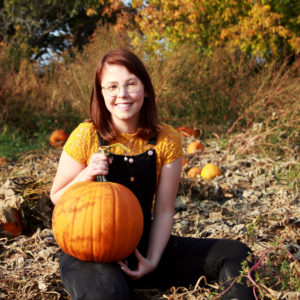New scholarship helps Lassonde, BJ ’20 pursue her Master of Journalism

Marianne Lassonde
Marianne Lassonde, BJ’20, got her first taste of documentary reporting during the one-year Bachelor of Journalism program at King’s.
“When I think of the people who create documentaries, I always think of these big movie producers who want to do a little side project… to think that you can actually do that in Halifax in your studies, you can just create something you’re really proud of … it’s really cool.”
Having graduated with a Bachelor of Journalism degree in May of 2020, Marianne is now enrolled in the Master of Journalism, which she’s pursuing from her home in Sherbrooke, Québec. She’s also the proud inaugural recipient of the John and Judy Bragg Family Foundation Journalism Scholarship, an award valued at just over $6,000.
Marianne had never imagined being involved with broadcast journalism before that year, but exposure to the format made an impact.
“I learned to use and master a medium that I had never really considered.”
The idea of studying journalism came to Marianne as a high school student while reading a book about career options, but it was a fleeting thought back then. It was not until studying at Bishop’s University that Marianne enrolled in a journalism course, after learning it would be taught by one of her favourite professors from CEGEP.
“I took it because I really liked him. His passion brought journalism back to the front of my mind, and I thought ‘you know, that would be a really interesting career path.’”
Having already completed a bachelor’s degree in English literature and drama at Bishop’s, Marianne signed up for the one-year Bachelor of Journalism at King’s, attracted by the prospect of the hands-on program. She focused her BJ work on “the human aspect of storytelling”, and now, through her masters, Marianne wants to develop a proficiency with statistics and data—information she now realizes can greatly impact a story.
One of the big areas of focus for Marianne’s masters program is learning to interpret data and to work with statistics. “You learn the impact of numbers… how a statistic can inspire a story,” she says.
Another consideration that interests Marianne is the potential for journalists to reach new audiences by sharing their stories on emergent social media platforms.
“There’s not enough importance placed on social media. News agencies are relying on Facebook and Instagram, and journalists are really relying on Twitter, but I think you [need to] shift your stories to platforms that are still evolving … I think one thing that journalists could and should do is learn to transfer their stories to younger platforms and get young people more involved with journalism … I think there’s a developing audience that’s just waiting to be introduced to different types of news through these platforms.”
Asked if there’s an issue that she would like to bring greater attention to, Marianne replies that underfunding in public education concerns her. She’s worked with the subject previously; during her BJ she prepared a short radio documentary that discussed teachers paying for classroom supplies out of pocket. The story looked at this topic against the backdrop of a bill that had recently been passed in Quebec to prevent schools from asking parents to contribute money for books and classroom activities. For Marianne, the radio piece was “way too short for how big this issue is.”
“I think there isn’t enough funding in public schools, and I think teachers are sometimes overlooked … that’s something I want to work with … especially right now with the pandemic and the workload that’s being added [because] of that.”
As she continues her studies, Marianne notes that the John and Judy Bragg Family Foundation Scholarship will provide her with support on two fronts:
“Obviously it helps alleviate financial stress, but also, on a more personal note, it’s a motivator—having someone root for you, in a way. Because the scholarship is kind of saying ‘Here you go, and I hope you succeed!’”

